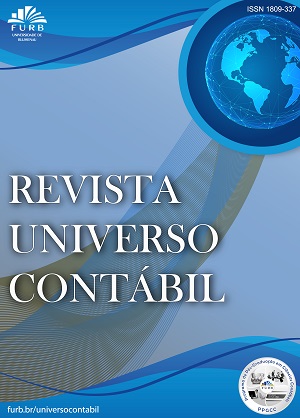IDENTIFYING ACCOUNTING INFORMATION GOVERNANCE MECHANISMS
DOI:
https://doi.org/10.4270/ruc.2021427Keywords:
Mechanisms, Governance, Accounting Information, Information Governance, IT GovernanceAbstract
Accounting has been facing challenges related to the information volume and the new technologies impact. One approach to improving the use and management of these resources is Information Governance. The article aims to identify mechanisms that can be used to govern accounting information, having the IT Governance and Information Governance Mechanisms as guiding elements. It begins with a systematic literature review, presenting a Governance Mechanisms consolidated list (IT and Information) based on Procedural, Structural and Relational practices. Afterward, interviews were conducted with accounting experts to obtain a list of these mechanisms adapted for accounting. The study's contributions focus on the consolidated presentation of Procedural, Structural, and Relational mechanisms that do not intend to exhaust the theme and on their use for a better decision-making process.
Downloads
References
Abraham, R., Schneider, J., & Brocke, J. V. (2019). Data governance: A conceptual framework, structured review, and research agenda. International Journal of Information Management. 49, 424-438.
Alhassan, I., Sammon, D., & Daly, M. (2018). Data governance activities: A comparison between scientific and practice-oriented literature. Journal of Enterprise Information Management, 31 (2), 300-316.
Arnaboldi, M., Busco, C., & Cuganesan, S. (2017). Accounting, accountability, social media and big data: Revolution or hype? Accounting, Auditing & Accountability Journal, 30 (4), 762-776.
Cockcroft, S., & Russell, M. (2018). Big data opportunities for accounting and finance practice and research. Australian Accounting Review, 28(86), 323-333.
Coyne, E. M., Coyne, J. G., & Walker, K. B. (2018). Big data information governance by accountants. International Journal of Accounting & Information Management, 26 (1), 153-170.
Demarquet, G. (2016). Five key reasons enterprise data governance matters to finance ... and seven best practices to get you there. Journal of Corporate Accounting and Finance. 47-51.
De Haes, S., & Van Grembergen, W. (2009). Exploring the relationship between IT governance practices and business/IT alignment through extreme case analysis in Belgian mid-to-large size financial enterprises. Journal of Enterprise Information Management, 22 (5), 615-637.
Faria, F. A., Maçada, A. C. G., & Kumar, K. (2017). Modelo estrutural de governança da informação para bancos. RAE-Revista de Administração de Empresas, 57 (1), 79-95.
Huerta, E., & Jensen, S. (2017). An accounting information systems perspective on data analytics and big data. Journal of Information Systems, 31 (3), p. 101-114.
Khatri, V., & Brown, C. V. (2010). Designing data governance. Communications of the ACM, 53(1), 148-152.
Kooper, M. N., Maes, R., & Lindgreen, E. E. O. R. (2011). On the governance of information: Introducing a new concept of governance to support the management of information. International Journal of Information Management, 31 (3), 195–200.
Lajara, T. T.; & Maçada, A. C. G. (2013). Information governance framework: The defense manufacturing case study. Proceedings of the Nineteenth Americas Conference on Information Systems (AMCIS), Chicago, EUA.
Lunardi, G. L., Becker, J. L., Maçada, A. C. G., & Dolci, P. C. (2014). The impact of adopting IT governance on financial performance: An empirical analysis among Brazilian firms. International Journal of Accounting Information Systems, 15, 66-81.
Lunardi, G., Maçada, A. C. G., Becker, J., & Van Grembergen, W. (2017). Antecedents of IT governance effectiveness: An empirical examination in Brazilian firms. Journal of Information Systems, 31(1), 41-57.
Otto, B. (2011). Organizing Data governance: Findings from the telecommunications industry and consequences for large service providers. Communications of the Association for Information Systems, 29 (3), 45-66.
Peterson, R. (2004). Crafting Information Technology Governance. Information Systems Management, 21 (4), 7-22.
Pricewaterhousecoopers (PWC). (2018). Pesquisa Global de Segurança da Informação. Recuperado de https://www.pwc.com.br/pt/global-state-of-information-security-survey-2018/revigorando-a-privacidade-e-a-confianca-em-um-mundo-baseado-em-dados.html.
Rikhardsson, P., & Yigitbasioglub, O. (2018). Business intelligence; analytics in management accounting research: Status and future focus. International Journal of Accounting Information Systems.
Tallon, P. P., Ramirez, R. V., & Short, J. E. (2013a). The information artifact in IT governance: Toward a theory of information governance. Journal of Management Information Systems, (30) 3, 141–177.
Tallon, P. P., Short, J. E., & Harkins, M. W. (2013b). The evolution of information governance at Intel. MIS Quarterly Executive, (12) 4, 189-198.
Ward, S., & Carter, D. (2019). Information as an asset todays board agenda: The value of rediscovering gold. Business Information Review.
Weber, K., Otto, B., & Österle, H. (2009). One size does not fit all - a contingency approach to data governance. Journal of Data and Information Quality, 1 (4), 1-27.
Weill, P., & Ross, J. (2004). IT governance: How top performers manage IT decision rights for superior results. Boston, EUA: Harvard Business School Press.
Zhai, J., & Wang, Y. (2016). Accounting information quality, governance efficiency and capital investment choice. China Journal of Accounting Research, 9(4), 251-266.
Published
How to Cite
Issue
Section
License
The copyright for papers published in this journal belong to the author, with rights of first publication for the journal. As the papers appears in this publicly accessed journal, the papers are for free use, receiving their credit, in educational and non-commercial uses. The journal will allow the use of the papers published for non-commercial purposes, including the right to send the paper to publicly accessed databases.


